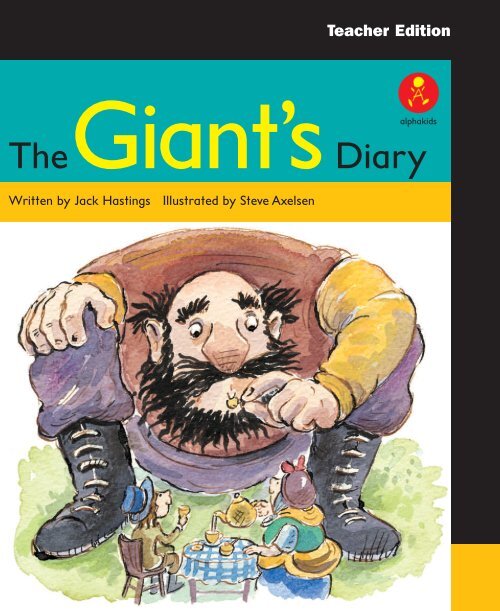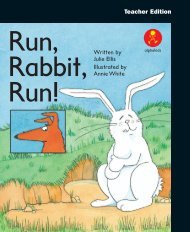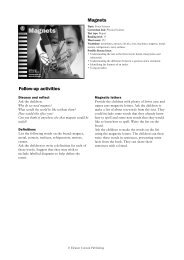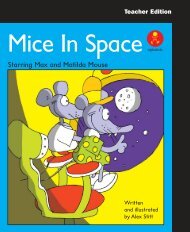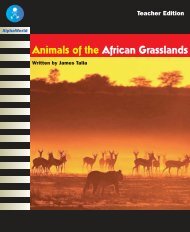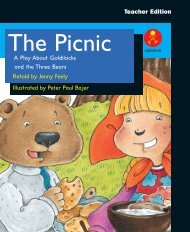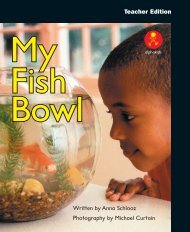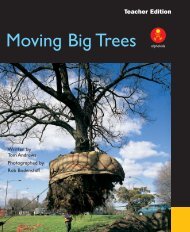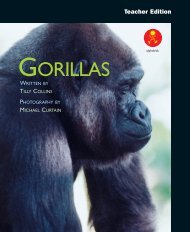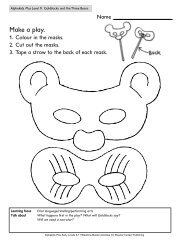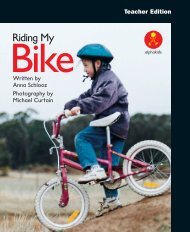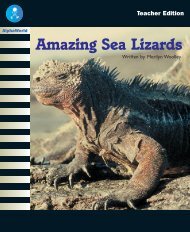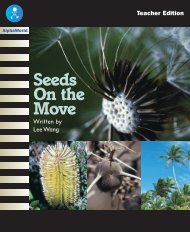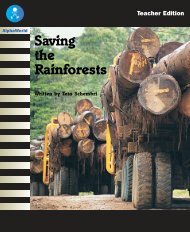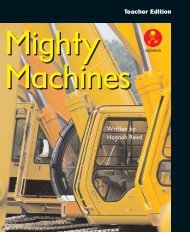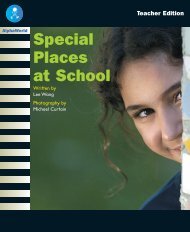The Giant's Diary
The Giant's Diary
The Giant's Diary
Create successful ePaper yourself
Turn your PDF publications into a flip-book with our unique Google optimized e-Paper software.
Teacher Edition<br />
<strong>The</strong>Giant’s<br />
alphakids<br />
<strong>Diary</strong><br />
Written by Jack Hastings Illustrated by Steve Axelsen
Published edition<br />
© Eleanor Curtain<br />
Publishing 2004<br />
Text © Elizabeth Golding<br />
Photographs<br />
© Eleanor Curtain<br />
Publishing<br />
First published 2004<br />
Apart from any fair dealing for<br />
the purposes of study, research,<br />
criticism or review, as<br />
permitted under the Copyright<br />
Act of Australia, no part of this<br />
book may be reproduced by<br />
any process, or transmitted in<br />
any form, without permission<br />
of the copyright owner. Where<br />
copies of part or the whole of<br />
this book are made under Part<br />
VB of the Copyright Act, the<br />
law requires that records of<br />
such copying be kept and the<br />
copyright owner is entitled to<br />
claim payment.<br />
Developed by<br />
Eleanor Curtain Publishing<br />
Designed by<br />
Alexander Stitt<br />
Production by<br />
Publishing Solutions<br />
Printed in China<br />
ISBN 0 7253 3283 2<br />
1 2 3 4 5 6 7 8 9<br />
04 05 06<br />
How to use this book<br />
<strong>The</strong> Alphakids Plus teacher<br />
editions support teachers as they<br />
guide children’s reading and<br />
thinking during one or more guided<br />
reading sessions. Teachers can<br />
observe children as they read and<br />
choose from the given suggestions<br />
to suit individual needs.<br />
Before reading<br />
Setting the context, front cover<br />
and title page:<br />
<strong>The</strong> suggestions help teachers to<br />
set the scene and prepare children<br />
for reading the book. Prompts help<br />
to determine children’s prior<br />
knowledge. Where necessary,<br />
background information is<br />
provided. Teachers are encouraged<br />
to check that children understand<br />
the vocabulary listed and to discuss<br />
the meanings and/or the structures<br />
of these words. Previous experiences<br />
with similar text types may also be<br />
discussed.<br />
During reading<br />
Predict, Read, Reflect:<br />
Questions encourage children to<br />
engage with the text by making<br />
predictions. <strong>The</strong>y then read a<br />
section of the text and reflect on<br />
what they have read. <strong>The</strong> focus is<br />
on the content, language and text<br />
features of the book.<br />
Observe and support:<br />
Prompts help teachers to focus on<br />
the strategies children use as they<br />
read. Teachers can then select from<br />
and adapt the suggestions according<br />
to the needs of the individual child.<br />
<strong>The</strong> suggestions aim to develop a<br />
child’s reading abilities.<br />
Interruptions to the child’s reading<br />
should be minimal.<br />
After reading<br />
A selection of reading and writing<br />
activities:<br />
<strong>The</strong> last pages of the teacher edition<br />
provide follow-up activities and<br />
include the assessment focus.<br />
Selected text features<br />
• <strong>The</strong> book is written as an<br />
autobiographic diary<br />
• Days of the week are featured<br />
Vocabulary<br />
diary, excitedly, fierce, frightened,<br />
headstart, interested, polite, squawking
Setting the context<br />
If the children are not familiar with the story ‘Jack and the Beanstalk’ read it<br />
to them as it will assist them in understanding this narrative. If they do know<br />
the story, ask them to retell it.<br />
What is the giant like? What do you think he would do if he met Jack again?<br />
This book is written as a diary. What would you find in a diary?<br />
alphakids<br />
<strong>The</strong>Giant’s <strong>Diary</strong><br />
Written by Jack Hastings Illustrated by Steve Axelsen<br />
<strong>The</strong>Giant’s <strong>Diary</strong><br />
Written by Jack Hastings<br />
Illustrated by Steve Axelsen<br />
Front cover<br />
What kind of book do you think this is?<br />
Why do you think that?<br />
Ask children to discuss the picture on the<br />
front cover of the book.<br />
What is the giant doing? Who is he<br />
drinking tea with? How do you think this<br />
happened?<br />
Title page<br />
What do you think the giant is writing?<br />
What does this picture add to what you<br />
now know about the story?
<strong>The</strong> Giant’s <strong>Diary</strong> Pages 2–3<br />
Predict<br />
What do you think the giants will be like?<br />
Look at the pictures on pages 2 and 3. Why do you<br />
think the pictures of the giants are so different?<br />
Read to the end of page 3.<br />
Reflect<br />
Who is writing this diary?<br />
What do people normally think of giants?<br />
What do you think Hugo and his wife are like?<br />
Observe and support<br />
Can the child point out the features of the book that<br />
indicate that it is a diary?<br />
This book is written as a diary. Show me the features<br />
of a diary that are in this book.<br />
2
Sunday<br />
Hi. My name is Hugo Grand and I’m a giant.<br />
My wife is a giant too.<br />
People think that giants are fierce and that they<br />
love stomping around and eating people.<br />
But I’m not interested in eating anyone.<br />
And when you’re as big as I am, you can’t help<br />
stomping just a little bit.<br />
I’d love to find some friends, but people run<br />
away screaming when they see me. No one<br />
comes to visit.<br />
Life is hard for giants.<br />
2 3<br />
3
<strong>The</strong> Giant’s <strong>Diary</strong> Pages 4–7<br />
Predict<br />
Look at the picture on pages 4 and 5. What do you think<br />
the giant is doing?<br />
Look at the picture on page 6. What is Jack doing?<br />
Read to the end of page 7.<br />
Reflect<br />
Why did the giant say ‘Fee Fi Fo Fum’? What was he<br />
trying to do?<br />
Why do you think the boy stole the harp and the goose?<br />
How is the giant feeling now?<br />
Observe and support<br />
Ask one child to read aloud to you while the others<br />
are reading silently. Can the child read the text<br />
fluently?<br />
Can you read this smoothly?<br />
Assist children by modelling fluent reading for them<br />
if necessary.<br />
4
Monday<br />
Today some strange things happened.<br />
At lunch time I could smell a small boy.<br />
I think he’s been here before, but I’ve never seen<br />
him. I hoped he might have come around to<br />
make friends.<br />
I played the ‘Fee Fi Fo Fum’ game that I used to<br />
play with my father when I was little. But the boy<br />
must have been hiding and he didn’t come out.<br />
I asked my magic harp to play and my goose to<br />
lay a golden egg. But the boy still didn’t appear<br />
and my harp played so softly and beautifully that<br />
I fell asleep.<br />
4 5<br />
Suddenly, a dreadful noise woke me up.<br />
My goose was very upset and squawking loudly.<br />
<strong>The</strong> harp was shouting my name.<br />
All at once I saw a small boy running out the<br />
door with my magic harp under one arm and<br />
my goose under the other!<br />
I couldn’t believe it.<br />
I ran after him but I tripped over my shoelace and he<br />
got a good headstart. He ran all the way to the top of<br />
the beanstalk that grew from his garden on the ground<br />
up to my house in the clouds. He had reached the<br />
ground and chopped down the beanstalk before I even<br />
got to the top.<br />
I suppose he didn’t want to be my friend after all.<br />
I don’t even have my goose or my harp to play with.<br />
Now I’m lonely AND bored!<br />
6<br />
7<br />
5
<strong>The</strong> Giant’s <strong>Diary</strong> Pages 8–9<br />
Predict<br />
What is the giant doing now?<br />
What are Jack and his mother doing?<br />
Do you think the giant will try to get back his magic harp<br />
and his goose?<br />
Read to the end of page 9.<br />
Reflect<br />
What did the giant notice about the boy and his mother?<br />
Why do you think that the boy stole the harp and the<br />
goose?<br />
Observe and support<br />
Does the child integrate a range of information to<br />
solve problems when they read?<br />
How did you know that word was ‘tiny’? What did you<br />
think about?<br />
6
Wednesday<br />
This morning the boy took some golden eggs to<br />
sell at the market and came home with a cow<br />
and a big basket of food.<br />
His mother was so excited that she danced<br />
around and around the house. <strong>The</strong>n they ate a<br />
big lunch.<br />
Now I think I know why the boy stole my harp<br />
and my goose! But I still miss them.<br />
Tuesday<br />
I had nothing else to do so I spent all morning watching<br />
the boy way down there on the ground.<br />
He built a lovely house for my goose and asked my magic<br />
harp to play for his mother. She looked very happy.<br />
<strong>The</strong>y must be very poor. <strong>The</strong>ir house is tiny. <strong>The</strong>y don’t<br />
have any animals, not even a cow. I wonder where they<br />
find money for food?<br />
8<br />
9<br />
7
<strong>The</strong> Giant’s <strong>Diary</strong> Pages 10–13<br />
Predict<br />
What do you think the giant will do next?<br />
Why does he need a ladder?<br />
Read to the end of page 12.<br />
Reflect<br />
How do you think that Jack and his mother felt when the<br />
giant peeped in the window?<br />
What did the giant really want to do?<br />
Observe and support<br />
Can the child understand the literal meaning of<br />
the text?<br />
Why did the giant want to make friends with Jack<br />
and his mother?<br />
8
Thursday<br />
I have decided what to do. I’ve built an<br />
enormous ladder. I’m going to climb<br />
down to the ground and talk things over<br />
with the boy and his mother.<br />
Maybe we can share the golden eggs.<br />
Maybe we can all listen to the harp<br />
together.<br />
Friday<br />
This morning when I climbed down my ladder<br />
the goose came running towards me and the<br />
harp played excitedly. But the boy and his<br />
mother screamed and ran inside.<br />
10<br />
11<br />
I peeped at them through the window and said,<br />
‘Don’t be frightened. I just want to make friends.’<br />
I tried to speak softly so my big voice wouldn’t<br />
scare them.<br />
<strong>The</strong>y came slowly out of the house.<br />
<strong>The</strong> boy said, ‘Hello, I’m Jack. This is my<br />
mother.’<br />
He looked sad and worried. ‘Please don’t be<br />
angry,’ he said. ‘I know it was wrong to steal<br />
your goose and your harp. I took them because<br />
we are very poor and very hungry.’<br />
‘I’m not angry,’ I said. ‘I’m just lonely and bored.<br />
My name is Hugo. It’s nice to meet you.’<br />
12 13<br />
9
<strong>The</strong> Giant’s <strong>Diary</strong> Pages 14–16<br />
Predict<br />
Why is the giant having a cup of tea with Jack and his<br />
mother?<br />
How do you think that Jack and his mother will get along<br />
with the giant?<br />
Read to the end of page 16.<br />
Reflect<br />
What did the giant do to help Jack and his mother?<br />
What do you think will happen when Jack and his mother<br />
go and stay with the giant? Will the giant still be friendly?<br />
Observe and support<br />
Can the child identify compound words? (firewood,<br />
tiptoe)<br />
What is a compound word? Show me a compound<br />
word on this page.<br />
10
‘What a polite giant!’ said Jack’s mother.<br />
‘Would you like a cup of tea?’<br />
‘Yes, please!’ I said. ‘I’d love a cup of tea!’<br />
After morning tea, I helped Jack collect some<br />
firewood. I walked on tiptoe so that the ground<br />
wouldn’t shake.<br />
We fixed a hole in the roof of the house.<br />
I helped his mother in the garden. I was careful<br />
not to step on her vegetables.<br />
I learned how to milk the cow.<br />
We talked about lots of things and had a<br />
wonderful time.<br />
14 15<br />
Next weekend Jack and his mother are going to<br />
come and stay with me and meet my wife.<br />
We’re going to share the goose and the harp.<br />
Life is good for some giants, don’t you think?<br />
16<br />
11
After reading<br />
Being a meaning maker<br />
Encourage the children to support<br />
their answers with evidence from<br />
the book as they discuss these<br />
questions:<br />
Why did the giant build a giant<br />
ladder?<br />
How did Jack and his mother feel<br />
when they saw the giant near their<br />
house?<br />
Why did the giant decide to share<br />
his harp and goose with Jack and<br />
his mother?<br />
What would you have done if you<br />
were the giant?<br />
Being a text user<br />
What kind of book is this?<br />
Who is telling the story?<br />
Discuss the features of a diary.<br />
Why are the days of the week at<br />
the top of some pages? What does<br />
this tell you about the book?<br />
Being a text critic<br />
In this book the author shows us<br />
that the giant is a kind person who<br />
is just lonely. Do you think this is<br />
true? Why?<br />
Were you happy with the way the<br />
story finished? Why?<br />
Being a code breaker<br />
Explore the following language<br />
features:<br />
• contractions: I’m, we’re, you’re,<br />
can’t, I’d, he’s, I’ve, didn’t, couldn’t,<br />
don’t, it’s, wouldn’t<br />
• letters used to represent the soft<br />
‘j’ sound in the book: giant, Jack,<br />
strange, magic, just<br />
12
Responding to text<br />
Create a play based on ‘<strong>The</strong><br />
Giant’s <strong>Diary</strong>’. Children<br />
work in cooperative groups to write<br />
a script for their play. <strong>The</strong>y will<br />
need to discuss the characters, what<br />
they will say, whether they will have<br />
a narrator, sets, props, etc. Give<br />
children plenty of time to prepare<br />
and then present their plays to the<br />
class.<br />
Compare the traditional<br />
story of ‘Jack and the<br />
Beanstalk’ with ‘<strong>The</strong> Giant’s <strong>Diary</strong>’.<br />
What is the same and what is<br />
different? Ask children to write<br />
about these and share them with<br />
the class.<br />
Locate all the contractions in<br />
‘<strong>The</strong> Giant’s <strong>Diary</strong>’. Write<br />
these onto cards showing the word<br />
as a contraction and as two words.<br />
For example: don’t = do not.<br />
Children work in pairs to make and<br />
then play the memory game with<br />
these words.<br />
Writing links<br />
Shared writing<br />
Discuss with the children how the<br />
story was written from the giant’s<br />
point of view. Read ‘<strong>The</strong> True Story<br />
of the Three Little Pigs!’ by Jon<br />
Scieszka. This was written from the<br />
wolf ’s point of view.<br />
Independent writing<br />
Ask children to write diaries from<br />
the point of veiw of a character<br />
from another folk tale, e.g. from the<br />
perspective of the big bad wolf in<br />
‘Little Red Riding Hood’.<br />
Possible assessment focus<br />
Can the child:<br />
• point out features of the book that indicate this is a diary?<br />
• say why the giant wanted to make friends with Jack and his mother?<br />
whole text activity sentence activity word activity
alphakids<br />
alphakids<br />
alphakids<br />
alphakids<br />
alphakidss<br />
alphakids<br />
<strong>The</strong>Giant’s <strong>Diary</strong><br />
Written by Jack Hastings Illustrated by Steve Axelsen<br />
Teacher<br />
Edition<br />
Other<br />
books<br />
at this<br />
level<br />
<strong>The</strong> Boy<br />
Who Wanted to be<br />
Famous<br />
Written by Claire Halliday Illustrated by Bettina Guthridge<br />
Topic: Problem solving<br />
Curriculum link: English<br />
Text type: <strong>Diary</strong><br />
Reading level: 22<br />
Word count: 744<br />
Vocabulary: diary, excitedly, fierce, frightened,<br />
headstart, interested, polite, squawking<br />
I Want to Be an<br />
Acrobat<br />
Written by Tom Andrews<br />
Photography by Ross Tonkin<br />
Moving Big Trees<br />
Written by<br />
Tom Andrews<br />
Photographed by<br />
Rob Bodenstaff<br />
Possible literacy focus<br />
Exploring the features of a diary.<br />
Understanding character motivation.<br />
Social<br />
Insects<br />
Written by Keith Pigdon<br />
Dragons<br />
Written by Jenny Feely<br />
Summary<br />
This book is an innovation on the folk tale ‘Jack and<br />
the Beanstalk’. In this version the story is told from<br />
the point of view of the giant, who is lonely. <strong>The</strong><br />
giant visits Jack’s house to make friends with Jack<br />
and his mother.<br />
ISBN 0- 7253- 3283- 2<br />
9 780725 332839<br />
alphakids


